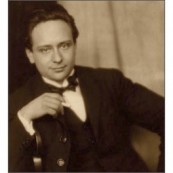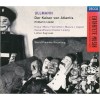Biography
Viktor Ullmann (1 January 1898, in Teschen – 18 October 1944, in KZ Auschwitz-Birkenau) was a Silesia-born Austrian[1] composer, conductor and pianist of Jewish origin.
Viktor Ullmann was born on January 1, 1898 in Těšín (Teschen), modern Český Těšín / Cieszyn. It belonged then to Silesia in the Austro-Hungarian Empire and is now divided between Cieszyn in Poland and Český Těšín in The Czech Republic. Both his parents were from families of Jewish descent, but had converted to Roman Catholicism[2] before Viktor's birth. As an assimilated Jew, his father, Maximilian, was able to pursue a career as a professional officer in the army of the Austro-Hungarian Empire. In World War I he was promoted to colonel and ennobled.
One writer has described Ullman's milieu in these terms: "Like such other assimilated German-speaking Czech Jews as Kafka and Mahler, Ullmann lived a life of multiple estrangements, cut off from Czech nationalism, German anti-Semitism and Jewish orthodoxy".[3]
Beginning in 1909 Viktor attended a grammar school (Gymnasium) in Vienna. His musical talents and inclinations soon gave him access to Arnold Schönberg and his circle of pupils. Upon finishing school, he volunteered for military service.
After deployment on the Italian Front at Isonzo [clarification needed], he was granted study leave, which he used to start studying law at Vienna University. There he also attended the lectures of Wilhelm Jerusalem. At the beginning of 1918 he was accepted in Schönberg's composition seminar. With Schönberg he studied the theory of form, counterpoint and orchestration. Ullmann was an excellent pianist, although he had no ambitions for a career as a soloist.
In May 1919, he broke off both courses of study and left Vienna in order to devote himself fully to music in Prague. His mentor was now Alexander von Zemlinsky, under whose direction he served as a conductor at the New German Theatre of Prague (now the Prague State Opera) until 1927. In the following season, 1927–28, he was appointed head of the opera company in Aussig an der Elbe (Ústí nad Labem), but his repertoire, including operas by Richard Strauss, Krenek and others, was too advanced for local tastes, and his appointment was terminated.
In 1923 with the Sieben Lieder mit Klavier (7 Songs with Piano) he witnessed a series of successful performances of his works, which lasted until the beginning of the 1930s (Sieben Serenaden). At the Geneva music festival of the International Society for New Music in 1929, his Schönberg Variations, a piano cycle on a theme by his teacher in Vienna, caused something of a stir. Five years later, for the orchestral arrangement of this work, he was awarded the Hertzka Prize, named in honor of the former director of Universal Editions. In the meantime he had been appointed conductor in Zürich for two years. As a result of his interest in anthroposophy, a movement founded by Rudolf Steiner, he spent another two years as a bookseller in Stuttgart, but was forced to flee Germany in mid-1933 and returned to Prague as a music teacher and journalist.
During this period he worked with the department of music at Czechoslovak Radio, wrote book and music reviews for various magazines, wrote as a critic for the Bohemia newspaper, lectured to educational groups, gave private lessons, and was actively involved in the program of the Czechoslovak Society for Music Education. At about this time Ullmann made friends with the composer Alois Hába, whom he had known for some time. Ullmann enrolled in Hába's department of quarter tone music at the Prague Conservatory, where he studied from 1935 to 1937.
While his works of the 1920s still clearly show the influence of Schönberg's atonal period, especially the Chamber Symphony Op. 9, the George Songs Op. 15 and Pierrot Lunaire, Op. 21, Ullmann's compositions from 1935 onwards, like the String Quartet No. 2 and Piano Sonata No. 1, are distinguished by his independent development of Schönberg's inspirations. Similarly the opera Fall of the Antichrist develops the issues raised by Alban Berg's opera Wozzeck. Dissonant harmonics, highly charged musical expression, and masterly control of formal structure are characteristic of Ullmann's new and henceforth unmistakable personal style.







